Ask a question from expert
Early Intervention Services for Infants and Toddles at Risk for Developmental Delays
135 Pages23968 Words427 Views
Added on 2022-01-22
About This Document
Thus the family's increased ability to cope with the presence of an exceptional child, and perhaps the child's increased eligibility for employment provide economic and social benefits (NIMH, 2008, pp. 11-12) In the Early Intervention Program (EIP), the primary prevention level is to reduce the occurrence of developmental disability through reduction of risk factors such as low birth weight, malnutrition and family awareness that child development can be influenced by their efforts.
Early Intervention Services for Infants and Toddles at Risk for Developmental Delays
Added on 2022-01-22
BookmarkShareRelated Documents
1
INTRODUCTION
1.1 CONTEXT OF THE STUDY
Early Intervention Services are special services for infants and toddlers
at risk for developmental delays. These services are designed to identify and meet children’s
needs in five developmental areas. These are physical, cognitive, communication, social or
emotional development, sensory and adaptive development. Early intervention includes
provision of services to such children and their families for the purpose of lessening the
effects of the condition. Early intervention can be remedial or preventive in nature-
remediating the existing developmental problems or preventing their occurrence.
Early Intervention Services are effective ways to address the needs of
infants and toddlers with developmental delays or disabilities. To ascertain the eligibility of
the child for early intervention certain screening and diagnostic measures are adopted. Some
children develop more slowly than the others or develop in ways that seem different from
other children. Any deviation from the normal development should be dealt with at the
earliest as it may lead to a developmental delay or the child may be at risk of developing
developmental delays.
The rate of human learning and development is most rapid in the early
years of life. Timing of intervention becomes particularly important when a child runs the
risk of missing an opportunity to learn during a state of maximum readiness. If the most
teachable moments or stages of greatest readiness are not taken advantage of, a child may
have difficulty in learning a particular skill at a later time. It is possible through early
identification and appropriate intervention that children can be helped to reach their
maximum potential.
INTRODUCTION
1.1 CONTEXT OF THE STUDY
Early Intervention Services are special services for infants and toddlers
at risk for developmental delays. These services are designed to identify and meet children’s
needs in five developmental areas. These are physical, cognitive, communication, social or
emotional development, sensory and adaptive development. Early intervention includes
provision of services to such children and their families for the purpose of lessening the
effects of the condition. Early intervention can be remedial or preventive in nature-
remediating the existing developmental problems or preventing their occurrence.
Early Intervention Services are effective ways to address the needs of
infants and toddlers with developmental delays or disabilities. To ascertain the eligibility of
the child for early intervention certain screening and diagnostic measures are adopted. Some
children develop more slowly than the others or develop in ways that seem different from
other children. Any deviation from the normal development should be dealt with at the
earliest as it may lead to a developmental delay or the child may be at risk of developing
developmental delays.
The rate of human learning and development is most rapid in the early
years of life. Timing of intervention becomes particularly important when a child runs the
risk of missing an opportunity to learn during a state of maximum readiness. If the most
teachable moments or stages of greatest readiness are not taken advantage of, a child may
have difficulty in learning a particular skill at a later time. It is possible through early
identification and appropriate intervention that children can be helped to reach their
maximum potential.
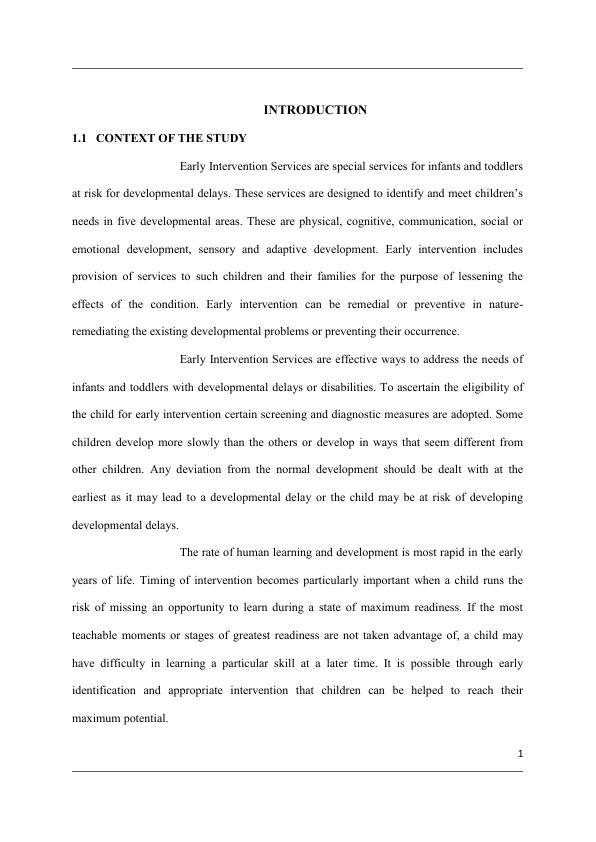
2
Early intervention services also have a significant impact on the parents and siblings of an
exceptional infant or young child. The family of a young exceptional child often feels
disappointed socially isolated and suffers from added stress, frustration, chronic, sorrow,
anxiety and helplessness. The compounded stress with the presence of an exceptional child
may affect the family’s well being which in turn may interfere with the child’s development.
Early intervention can result in parents having improved attitudes about themselves and their
child, improved information and skills for teaching their child and more time for leisure and
enjoyment.
Intervening early is also beneficial to the society at large as it ensures
the child’s developmental and educational gains which will decrease its dependence upon
social institutions. Thus the family’s increased ability to cope with the presence of an
exceptional child, and perhaps the child’s increased eligibility for employment provide
economic as well as social benefits (NIMH, 2008, pp. 11-12)
In Early Intervention Program (EIP), the primary prevention level is to
reduce the occurrence of developmental disability through reduction of risk factors such as
low birth weight, malnutrition and family awareness that child development can be
influenced by their efforts. At a Secondary Prevention level, the goal is to reduce the extent
of manifested childhood disability and shorten its duration. Infant stimulation and
remediation programs operate at this level. In Tertiary Prevention, the aim is to prevent or
reduce complications of disability (physical and behavioral) that lead to a need for
institutionalization. The Program should also enhance the family’s understanding of its
infant’s limitations, strengths and needs, and promote the family’s ability to advocate for its
Early intervention services also have a significant impact on the parents and siblings of an
exceptional infant or young child. The family of a young exceptional child often feels
disappointed socially isolated and suffers from added stress, frustration, chronic, sorrow,
anxiety and helplessness. The compounded stress with the presence of an exceptional child
may affect the family’s well being which in turn may interfere with the child’s development.
Early intervention can result in parents having improved attitudes about themselves and their
child, improved information and skills for teaching their child and more time for leisure and
enjoyment.
Intervening early is also beneficial to the society at large as it ensures
the child’s developmental and educational gains which will decrease its dependence upon
social institutions. Thus the family’s increased ability to cope with the presence of an
exceptional child, and perhaps the child’s increased eligibility for employment provide
economic as well as social benefits (NIMH, 2008, pp. 11-12)
In Early Intervention Program (EIP), the primary prevention level is to
reduce the occurrence of developmental disability through reduction of risk factors such as
low birth weight, malnutrition and family awareness that child development can be
influenced by their efforts. At a Secondary Prevention level, the goal is to reduce the extent
of manifested childhood disability and shorten its duration. Infant stimulation and
remediation programs operate at this level. In Tertiary Prevention, the aim is to prevent or
reduce complications of disability (physical and behavioral) that lead to a need for
institutionalization. The Program should also enhance the family’s understanding of its
infant’s limitations, strengths and needs, and promote the family’s ability to advocate for its
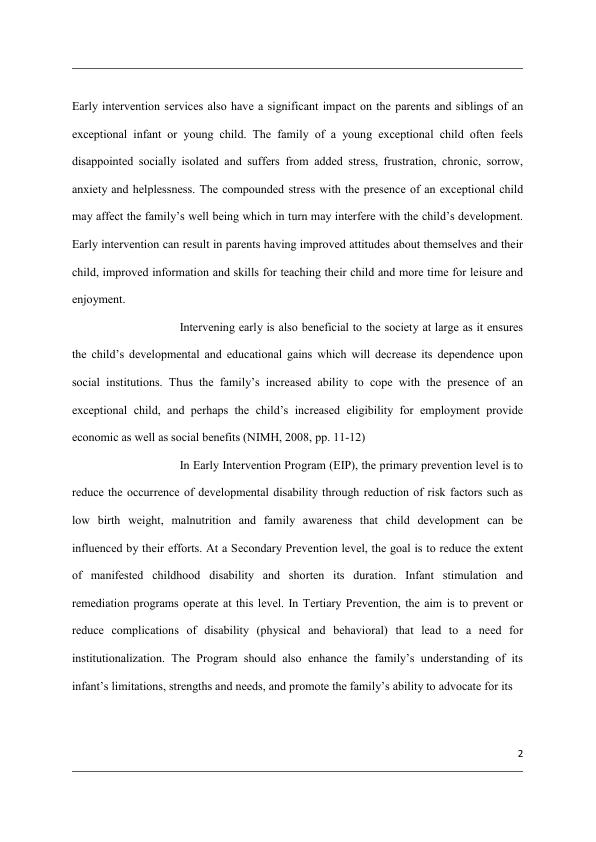
3
infant. For effective intervention, a multi-disciplinary team approach has been advocated, the
composition of which may vary depending on the available resources.
1.2 NEED AND SIGNIFICANCE OF STUDY
The rationale behind Early Intervention is that much of what the child
learns as an infant or a very young child is important to the development of later
competencies. This implies that early learning is foundation to later learning which is one of
the principles of child development.
This gets ample support from Piaget’s theory of Cognitive
development in which intelligence is depicted as a developmental phenomenon and an
adaptive process. The basic behavior patterns or schemes which are acquired, repeated,
integrated or in combination form complex response patterns which help in achieving higher
cognitive proficiency. He also considered this early age of 0-2 as Sensory-motor period.
Hence the early age period is the most appropriate period to lay the basic foundations for
further development and learning. The early childhood period is considered a critical period
and early intervention programmes utilize these periods to the best advantage of the child.
(NIMH, 2008, p.13)
Early Intervention Services include a range of healthcare,
developmental, therapeutic, social and cultural services for young children and their families.
Children grow very rapidly in early years and any stimulation at this stage helps to promote a
child’s optimum growth and development.
Thus it is presumed that early intervention provides the brain a second
chance to revisit some of the developmental stages which have once been omitted or
incomplete.
infant. For effective intervention, a multi-disciplinary team approach has been advocated, the
composition of which may vary depending on the available resources.
1.2 NEED AND SIGNIFICANCE OF STUDY
The rationale behind Early Intervention is that much of what the child
learns as an infant or a very young child is important to the development of later
competencies. This implies that early learning is foundation to later learning which is one of
the principles of child development.
This gets ample support from Piaget’s theory of Cognitive
development in which intelligence is depicted as a developmental phenomenon and an
adaptive process. The basic behavior patterns or schemes which are acquired, repeated,
integrated or in combination form complex response patterns which help in achieving higher
cognitive proficiency. He also considered this early age of 0-2 as Sensory-motor period.
Hence the early age period is the most appropriate period to lay the basic foundations for
further development and learning. The early childhood period is considered a critical period
and early intervention programmes utilize these periods to the best advantage of the child.
(NIMH, 2008, p.13)
Early Intervention Services include a range of healthcare,
developmental, therapeutic, social and cultural services for young children and their families.
Children grow very rapidly in early years and any stimulation at this stage helps to promote a
child’s optimum growth and development.
Thus it is presumed that early intervention provides the brain a second
chance to revisit some of the developmental stages which have once been omitted or
incomplete.
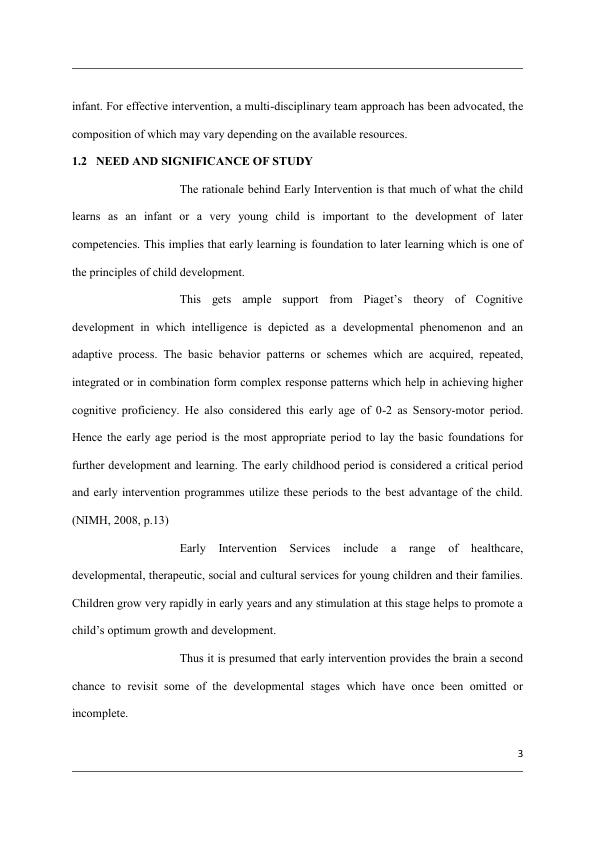
4
Therefore the basis for early intervention is that by providing a
stimulating environment, creating appropriate opportunities for learning and providing
support to the families, young children who are at risk or already have developmental delays
could be helped.
Intervention encourages and helps parents to gain skills in observing
their infants and young children, and in understanding that children learn from their play.
Parents are helped to become aware of materials and activities that are suitable for children at
each stage of development, and the community resources and services are made available to
them as they work with their children.
The child is considered to be “at risk” because of adverse genetic,
prenatal, perinatal, neonatal or environmental influences that may lead to subsequent
development of a handicap or developmental deviation. Intelligence and other human
capacities are not fixed at birth, but rather they are shaped to some extent by environmental
influences and through learning. Handicapping conditions may interfere with development
and learning due to which disability becomes serious and secondary handicaps may appear.
Parents need special assistance in establishing meaningful patterns of parenting a
handicapping conditions or a child at risk. Parental involvement is considered to be a key
element in the success of early intervention programs. Parental involvement is necessary in
providing adequate care, stimulation and training for their child during critical years when
basic developmental skills should be established.
Many reasons have been offered for why parents should be involved in
early intervention programs. (Bristol & Gallagher, 1982; Peterson, 1987; Turnbull &
Turnbull, 1986)
Therefore the basis for early intervention is that by providing a
stimulating environment, creating appropriate opportunities for learning and providing
support to the families, young children who are at risk or already have developmental delays
could be helped.
Intervention encourages and helps parents to gain skills in observing
their infants and young children, and in understanding that children learn from their play.
Parents are helped to become aware of materials and activities that are suitable for children at
each stage of development, and the community resources and services are made available to
them as they work with their children.
The child is considered to be “at risk” because of adverse genetic,
prenatal, perinatal, neonatal or environmental influences that may lead to subsequent
development of a handicap or developmental deviation. Intelligence and other human
capacities are not fixed at birth, but rather they are shaped to some extent by environmental
influences and through learning. Handicapping conditions may interfere with development
and learning due to which disability becomes serious and secondary handicaps may appear.
Parents need special assistance in establishing meaningful patterns of parenting a
handicapping conditions or a child at risk. Parental involvement is considered to be a key
element in the success of early intervention programs. Parental involvement is necessary in
providing adequate care, stimulation and training for their child during critical years when
basic developmental skills should be established.
Many reasons have been offered for why parents should be involved in
early intervention programs. (Bristol & Gallagher, 1982; Peterson, 1987; Turnbull &
Turnbull, 1986)
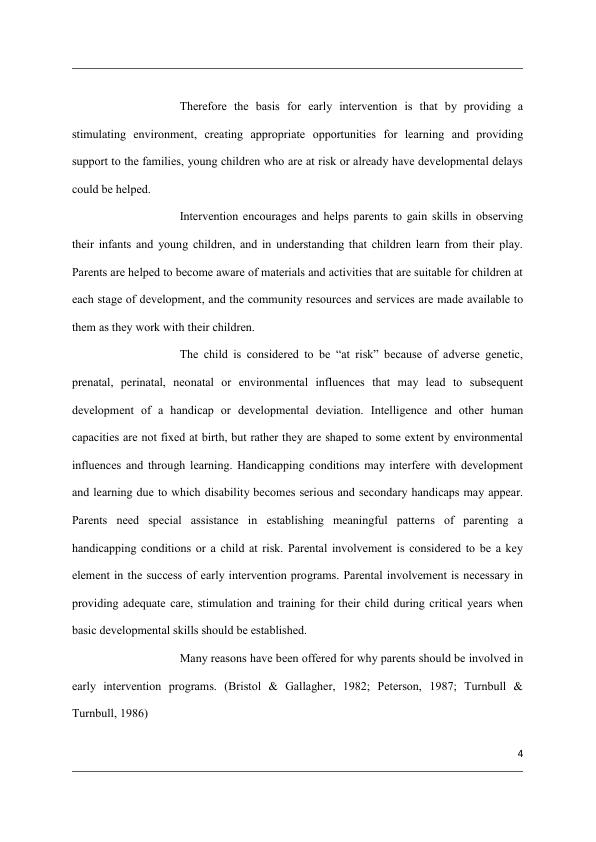
5
The following rationales are frequently offered as to why it is
important to involve parents:
Parents are responsible for the welfare of their children. Most parents want a voice in how
their child is educated because they are ultimately responsible for the child's well-being
and welfare.
Early intervention programs which involve parents result in greater benefits for children.
It is often alleged that, by involving the family (i.e., the people with whom the child
spends the majority of his or her time), the benefits of early intervention programs will be
strengthened.
Parent involvement activities benefit parents and family members. By helping parents
understand their child's current situation and potential and how to manage their child's
needs and demands, it is often claimed that parents will have reduced levels of stress,
more satisfaction, and a more realistic perception of what is possible and desirable.
Participation in early intervention programs also exposes parents to other agencies and
services which may be useful to them in other aspects of their life.
By involving parents, the same outcomes can be achieved at less cost. Early intervention
services can be very expensive. If parents can be used to deliver a portion of the services,
it is often suggested that the costs of early intervention can be dramatically reduced.
The benefits of early intervention are maintained better if parents are involved. It is often
argued that the involvement of parents will reinforce and maintain the benefits of early
intervention because they are the only ones who will be consistently involved with the
The following rationales are frequently offered as to why it is
important to involve parents:
Parents are responsible for the welfare of their children. Most parents want a voice in how
their child is educated because they are ultimately responsible for the child's well-being
and welfare.
Early intervention programs which involve parents result in greater benefits for children.
It is often alleged that, by involving the family (i.e., the people with whom the child
spends the majority of his or her time), the benefits of early intervention programs will be
strengthened.
Parent involvement activities benefit parents and family members. By helping parents
understand their child's current situation and potential and how to manage their child's
needs and demands, it is often claimed that parents will have reduced levels of stress,
more satisfaction, and a more realistic perception of what is possible and desirable.
Participation in early intervention programs also exposes parents to other agencies and
services which may be useful to them in other aspects of their life.
By involving parents, the same outcomes can be achieved at less cost. Early intervention
services can be very expensive. If parents can be used to deliver a portion of the services,
it is often suggested that the costs of early intervention can be dramatically reduced.
The benefits of early intervention are maintained better if parents are involved. It is often
argued that the involvement of parents will reinforce and maintain the benefits of early
intervention because they are the only ones who will be consistently involved with the

6
child. Responsibilities of agencies may change, the family may move, funding may be
cut, but the child will always be a member of his/her family.
Hence, it is important, that parents of children with developmental
disabilities be aware and be fully involved in early intervention services. In this context, there
is a need to study about the awareness and involvement of parents in early intervention, its
services and benefits for their children suffering from developmental disabilities.
1.3 SCOPE OF THE STUDY
This study is expected to throw light on the need for parental
awareness and involvement in early intervention. The advantage of examining the parental
awareness and involvement on different aspects of early intervention are that they can
increase the knowledge base regarding parental awareness and involvement. Another
advantage of the study is that, recommendations can be made to early intervention centers
and families on the need to be aware and involved in various aspects of early intervention for
the benefit of disabled children. It is hoped that, the findings of the study will help the
administrators and therapists of early intervention centers to create awareness among the
parents on the importance of parental involvement in early intervention. The investigator
expects the results of the study would be of use to all, concerned with the education, training
and development of children with developmental disabilities.
1.4 STATEMENT OF THE PROBLEM
The study aims in ascertaining the level of awareness and involvement
of parents on early Intervention of children with developmental disabilities. Therefore, the
study is entitled as “Awareness and Involvement of Parents in Early Intervention of
Children with Developmental disabilities”
child. Responsibilities of agencies may change, the family may move, funding may be
cut, but the child will always be a member of his/her family.
Hence, it is important, that parents of children with developmental
disabilities be aware and be fully involved in early intervention services. In this context, there
is a need to study about the awareness and involvement of parents in early intervention, its
services and benefits for their children suffering from developmental disabilities.
1.3 SCOPE OF THE STUDY
This study is expected to throw light on the need for parental
awareness and involvement in early intervention. The advantage of examining the parental
awareness and involvement on different aspects of early intervention are that they can
increase the knowledge base regarding parental awareness and involvement. Another
advantage of the study is that, recommendations can be made to early intervention centers
and families on the need to be aware and involved in various aspects of early intervention for
the benefit of disabled children. It is hoped that, the findings of the study will help the
administrators and therapists of early intervention centers to create awareness among the
parents on the importance of parental involvement in early intervention. The investigator
expects the results of the study would be of use to all, concerned with the education, training
and development of children with developmental disabilities.
1.4 STATEMENT OF THE PROBLEM
The study aims in ascertaining the level of awareness and involvement
of parents on early Intervention of children with developmental disabilities. Therefore, the
study is entitled as “Awareness and Involvement of Parents in Early Intervention of
Children with Developmental disabilities”
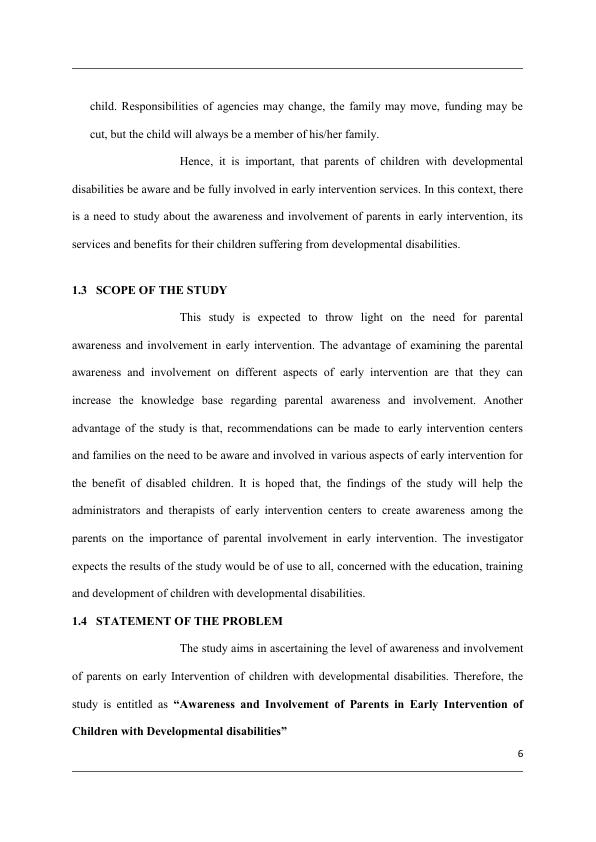
7
1.5 OPERATIONAL DEFINITIONS
Definitions of the important terms used in this study are given below:-
AWARENESS
Knowledge or perception of a situation or fact.
INVOLVEMENT
To cause someone to be associated with someone or something.
In this study, ‘Parental involvement’ means the active role of parents in their child’s early
intervention program.
PARENTS
Father or Mother of children with developmental disabilities.
EARLY INTERVENTION
Early Intervention is a term, which broadly refers to a wide range of experiences and supports
provided to children, parents and families during the pregnancy, infancy and early childhood
period of development.
CHILDREN WITH DEVELOPMENTAL DISABILITIES
Developmental disabilities are a group of conditions due to impairment in physical, learning,
language or behavior areas. These conditions begin during the developmental period, may
impact day to day functioning and usually last through a person’s life.
1.5 OPERATIONAL DEFINITIONS
Definitions of the important terms used in this study are given below:-
AWARENESS
Knowledge or perception of a situation or fact.
INVOLVEMENT
To cause someone to be associated with someone or something.
In this study, ‘Parental involvement’ means the active role of parents in their child’s early
intervention program.
PARENTS
Father or Mother of children with developmental disabilities.
EARLY INTERVENTION
Early Intervention is a term, which broadly refers to a wide range of experiences and supports
provided to children, parents and families during the pregnancy, infancy and early childhood
period of development.
CHILDREN WITH DEVELOPMENTAL DISABILITIES
Developmental disabilities are a group of conditions due to impairment in physical, learning,
language or behavior areas. These conditions begin during the developmental period, may
impact day to day functioning and usually last through a person’s life.
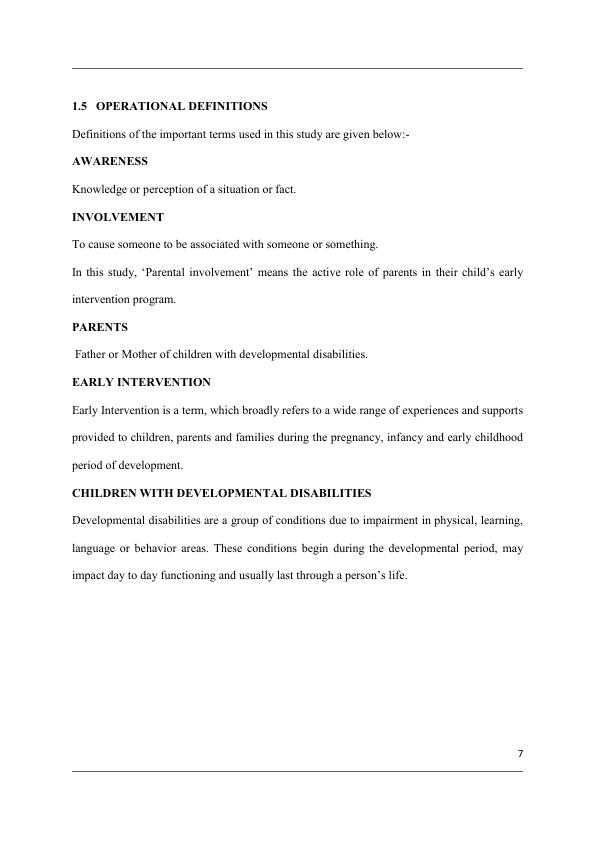
8
1.6 OBJECTIVES OF THE STUDY
General Objective
To find out the level of awareness and involvement of parents in Early Intervention of
children with developmental disabilities.
Specific Objectives
1. To find out the level of awareness of parents on the importance of Early Intervention.
2. To find out the level of awareness of parents on the importance of parental involvement
in Early Intervention.
3. To find out the level of awareness of parents on developmental disabilities.
4. To find out the level of awareness of parents regarding the Early Intervention services.
5. To find out the level of awareness of parents on Early Intervention with respect to Socio
Demographic Variables.
6. To find out the level of involvement of parents in their child’s Early Intervention
Program.
7. To find out the level of involvement of parents with respect to certain socio-demographic
variables.
1.7 HYPOTHESIS
On the basis of the objectives of the study the researcher developed the following
hypothesis.
There is no significant difference in the level of awareness of parents on early
intervention with respect to selected Socio-demographic variables.
1.6 OBJECTIVES OF THE STUDY
General Objective
To find out the level of awareness and involvement of parents in Early Intervention of
children with developmental disabilities.
Specific Objectives
1. To find out the level of awareness of parents on the importance of Early Intervention.
2. To find out the level of awareness of parents on the importance of parental involvement
in Early Intervention.
3. To find out the level of awareness of parents on developmental disabilities.
4. To find out the level of awareness of parents regarding the Early Intervention services.
5. To find out the level of awareness of parents on Early Intervention with respect to Socio
Demographic Variables.
6. To find out the level of involvement of parents in their child’s Early Intervention
Program.
7. To find out the level of involvement of parents with respect to certain socio-demographic
variables.
1.7 HYPOTHESIS
On the basis of the objectives of the study the researcher developed the following
hypothesis.
There is no significant difference in the level of awareness of parents on early
intervention with respect to selected Socio-demographic variables.
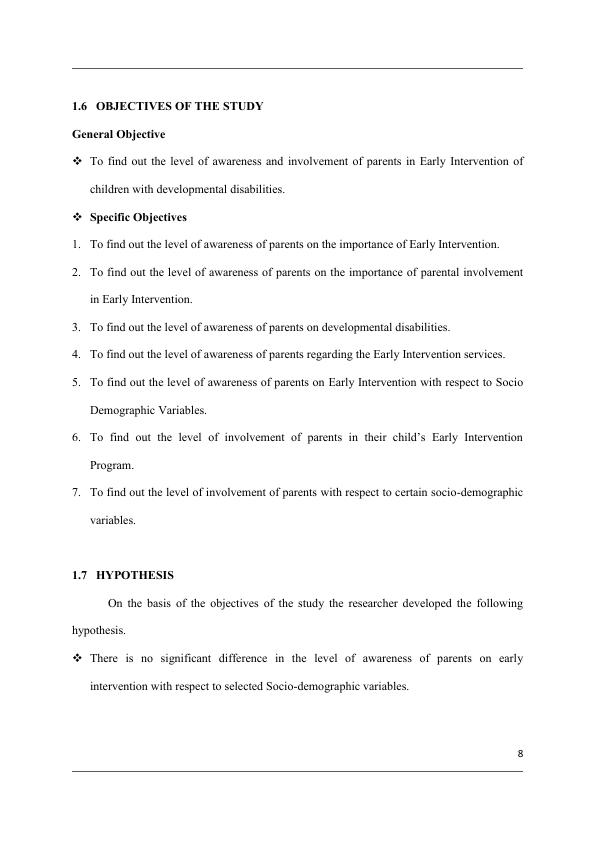
End of preview
Want to access all the pages? Upload your documents or become a member.
Related Documents
Support use of early interventions to promote positive outcomes for children and young people's developmentlg...
|4
|784
|91
Early Intervention Australialg...
|4
|684
|102
The Provision of Primary Care for Infantslg...
|4
|560
|276
Learning Log and Application Task Assessment 2022lg...
|4
|674
|44
Environment in Early Childhood Settingslg...
|10
|2270
|395
Importance of Environment in Promoting Positive Behaviors in Toddlerslg...
|9
|2225
|461